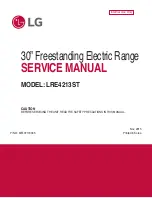
-6-
STEP 3 - Range Installation
A. A free-standing range may be installed by one person.
B. Align the range to its designated location and slide it
back into position. Note: A minimum clearance of 1/4
²
(6 mm) is required between the range and the leveling
foot that will engage the ANTI-TIP bracket, see figure
5.
CAUTION:
Damage to the range may occur if range is
moved or lifted by grasping the main top or backguard.
C. All freestanding ranges with a glass top have a non
lift-up top. Coil tops are lift-up.
D. For SAFETY CONSIDERATIONS as well as optimum
performance adjust the range so that it is level. This
may be checked by placing a spirit level or a large pan
of water on the cooktop or the oven rack. If an
adjustment is required pull the range forward, tip the
range and rotate the leveling feet as required.
E. To check the range for proper installation of the anti-tip
bracket: Use a flashlight and look underneath the
bottom of the range to see that one of the rear leveling
feet is engaged in the bracket slot.
F. Proceed with the remainder of the installation
instructions provided with the range.
CONNECTING THE RANGE
ELECTRIC SUPPLY
The range must be installed in accordance with Local and
National Electric Code (NEC) ANSI/NFPA No. 70-latest
edition. See rating plate for total connected KW rating.
ELECTRIC SUPPLY (Canada)
The range must be installed in accordance with Local and
Canadian Electric Code CSA STD.C22.1 latest edition.
See rating plate for total connected KW rating.
OUTSIDE WIRING
Your local utility company will tell you whether the present
electric service to your home is adequate. It may be
necessary to increase the size of the wiring to the house
and service switch to take care of the electrical load
demanded by the range. The kilowatt rating for the range
is specified on the rating plate located on front of range.
HOUSE WIRING
Most local Building Regulations and Codes require that all
electrical wiring be done by licensed electricians. All
wiring should conform to Local and National Electrical
Codes. This range requires a single phase three or four
wire 120/240 volt, 60 Hz, AC circuit. Wiring codes require
a separate circuit be run from the main entrance panel to
the range and that it be equipped with separate
disconnect switch and fuses, either in the main entrance
panel or in a separate switch and fuse box. In some
communities, a solid or flexible continuous armored
conduit must be used from main entrance panel to the
terminal box on the rear of the range. Others will permit
the termination of the range circuit at a polarized three or
four wire plug-in outlet placed at a convenient point near
the back of the range. The range is then connected to this
outlet through an approved range connector (pigtail)
fastened securely to the terminal block with proper strain
relief at the range and a three or four pronged plug at the
opposite end.
RANGE CONNECTIONS
Some models are shipped direct from the factory with
service cords (pigtails) attached. There are no range
connections necessary on these models. Just plug into
the range outlet. On models not provided with a service
cord, connection to the power supply is necessary.
REMEMBER - mobile homes and many LOCAL CODES
DO NOT PERMIT GROUNDING THROUGH NEUTRAL.
Hence, 4-wire service MUST be provided for such
installations. 3-wire service may be used when permitted
by local code. Use COPPER WIRE ONLY. Make
connections as explained below and with reference to the
appropriate illustration (see figures 7 and 8). After
installation, insure tightness of all electrical connections
and replace all covers.
Remove terminal block access cover from range back.
(See figure 6).
RANGE CONNECTIONS (Canada)
This model was shipped direct from the factory with
service cord (pigtail) attached. There are no range
connections necessary. Just plug into the range outlet.
See figure 2 on page 3 for outlet location.
NOTE:
Cord replacement -
ONLY
a power supply cord
rated at 240 volts minimum, 40 amperes or 50 amperes
power supply cord that is marked for use with nominal
1 3/8
²
(34.93 mm) diameter connection opening, with
closed loop terminals and marked for use with ranges
shall be used.
FIGURE 6







































